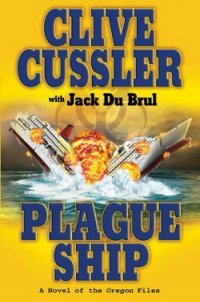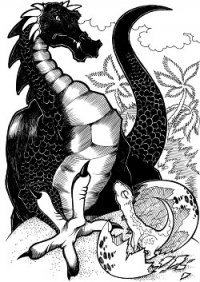Circle of Bones - Kling Christine (полная версия книги txt) 📗
“Shhh. I’ll call Mrs. Wright.”
“No, I said. Please. He’s my boy.”
This last came out as a wail and she saw his eyes were glossy with tears.
Riley heard footsteps on the stairs. “Dad, listen. Mrs. Wright’s coming. It’s going to be okay.”
He grabbed both her arms and squeezed so tight it hurt. “I told you, Elizabeth. There was nothing I could do. They wouldn’t listen. I tried to stop them. They said he had to die.”
“What? Dad, what are you talking about?”
Riley jumped when she heard a voice from across the room. “You know better than to speak of these things, Yorick.”
Her father’s eyes grew wide and he moaned, then let go of her arms. She stood up and saw Diggory standing just inside the doorway.
CHAPTER FIFTY-EIGHT
The Atlantic Ocean
February 17, 1942
By the fifth day, Woolsey decided he might go mad before they ever got to Martinique.
When they first locked him in the hold with only a corpse for company, they left him in darkness for what seemed like a fortnight. But once they opened the door on him blinking and shivering, he learned it had only been about twelve hours. That first time, the captain came down to the hold and oversaw things himself, the pistol displayed on his waist. Lamoreaux only allowed two men into the compartment, and though he ignored Woolsey, he watched his crew’s every move as they walked among the crates that contained the gold. The men removed Mullins’ body, swept up the broken glass, and allowed Woolsey to go to the WC under guard.
After that, it was only Michaut who was allowed into the hold. They left the lights on for him during the day, shut them off at night. Michaut came in with his food rations and escorted him to use the toilet twice a day. The young man wasn’t as friendly as he had been before the bomb. Woolsey ate in silence while Michaut waited for his dishes. If the two of them happened to pass another sailor in the confines of the sub’s passages, likely as not, the Frenchman would curse under his breath or spit on the ground at Woolsey’s feet.
After they turned the lights on and cleaned away the glass, Woolsey had played with the gold coins to amuse himself. The captain had collected the coins from the broken bottles and placed them in a cloth sack inside one of the crates. Woolsey took it out from time to time and poured the coins into his hands, letting them clang on the deck. Though his was a wealthy family, and he had never lacked for anything, still, there was something glorious about feeling the heft and mass of that much gold. He passed the hours trying to calculate just how many coins were there in all the cases.
But after four days of not talking to another human being, he decided he just might be going crazy. When Michaut entered the hold, dropped his tin plate and mug onto a crate, then began to unload cutlery from his various pockets, Woolsey leaned against the bulkhead, his arms crossed. He watched the heart-shaped birthmark on the young man’s face grow brighter under the scrutiny. Woolsey said, “So, have you got orders against talking to me?”
Michaut shook his head, but he refused to look at Woolsey. He sat down on another crate, his back turned.
Woolsey sat down on the crate next to his food and rubbed the stubble growth on his chin. “Any chance you could get me a razor, Kewpie?”
Michaut sighed and shook his head. Without turning around, he said, “Lieutenant, why do you want to blow up this boat? You hate the French people?”
Woolsey picked up a fork and wolfed down a couple of bites from his plate of stewed beef and potatoes, soaking up some of the rich wine gravy with a slab of French bread. He wiped his mouth on his sleeve.
“Michaut,” he said at last. “This is war. It’s not personal.”
“But if you kill me, I think that is very personal.”
“Yeah, well, I was following orders. Like you’re following orders now.”
Woolsey drained the mug of water while his young companion stood up and wandered over to one of the cases. Michaut pulled out the cloth sack and looked inside.
“You do realize, Henri, that by turning me over to the authorities in Martinique, you’re killing me? They’ll hang me for trying to blow up Surcouf.”
“Yes, but there is nothing I can do.” He reached inside the bag and pulled out a handful of coins.
“Just as there was nothing I could do when I received my orders.”
After another period of quiet, the young man said, “I hate this stupid war.” He let the coins fall back into the bag and the soft clinking noise sounded almost like music.
Woolsey smiled. “Not everyone feels that way. Some men are making a great deal of money off this war.”
Woolsey watched the young man reach back into the bag, take several coins out and place them in his pocket.
“That’s what doomed Surcouf, you know. Not that gold. No one knew about that except your captain. But all the money the Allies have put into this old boat. No return on that.”
Michaut replaced the bag in the crate.
Woolsey continued. “It’s always about the money, isn’t it? And politics. Power.”
Michaut shrugged.
“Kewpie, what would you say if I told you that I’m not only a Lieutenant in the Royal Navy?”
“I don’t understand, sir.”
“Neither do I sometimes. But I also work for some Americans. Got involved when I went to university in the states. A place called Yale. Ever heard of it?”
Michaut shook his head.
“Doesn’t matter,” Woolsey said. “They don’t want you to know who they are. Very hush, hush, you know. They invited me to join their lot in the spring of ’40. Anyway, lots of money to be made in a war like this and these Yanks, boy, they know how to do it.”
“I do not understand.”
“Listen, man, somebody has got to build all these ships and planes, make the bombs and the bullets. They sell them to the government and make a fortune, and they know there will always be a need for more as long as we are at war.”
“But many men are dying.”
Woolsey shrugged. “Not their problem. But one thing they’re not interested in is seeing America pour millions of dollars into an old French submarine. The problem is, General DeGaulle would never stand for seeing this boat retired. So she must be martyred.”
Michaut turned to face Woolsey. “No. Is not necessary. That is why we go to Martinique.”
“I’m not so sure we’ll make it, my friend. When the Americans don’t hear from me, they will send out planes looking for the Surcouf. There is something aboard this boat they do not want to see fall into the enemy’s hands. In fact, I’m certain they are searching for us right now.”
It was less than an hour after Michaut had left with his dirty dishes, when the door to the hold opened again and Gohin entered with Michaut. It was exactly what Woolsey had predicted would happen.
Gohin shouted, “Allez. Vite.”
“Come with us,” Michaut said. “Le Capitaine want to talk to you.”
The captain’s cabin on board the Surcouf was quite large for a submarine. It contained a small writing desk and another sitting chair opposite. The bulkheads were paneled in rich, varnished wood. The captain turned from where he had been working at his desk when they entered. He lifted a white ceramic coffee mug, took a drink, then indicated the extra chair by gesturing with the mug.
“Sit down, Lieutenant.”
Woolsey eased himself into the chair. He saw the plate on the desk and realized they had interrupted his meal.
“What’s this Michaut tells me about something else on board this vessel that I know nothing about?”
“Do you remember the mail bag we got from that Canadian frigate a couple of days before we arrived in Bermuda?”
“Yes.”
“There was a diplomatic pouch from London with highly classified documents in there. My instructions were to set the device aboard the Surcouf and then to deliver those documents to America. It’s been several days now, and they have not heard from me. They will have figured out that something went wrong — that I’m still aboard this boat. I don’t know what’s in that pouch, sir, but I’m certain the Yanks are scouring the Atlantic right now looking for us. When they see you’re headed for an enemy port, they won’t hesitate.”




